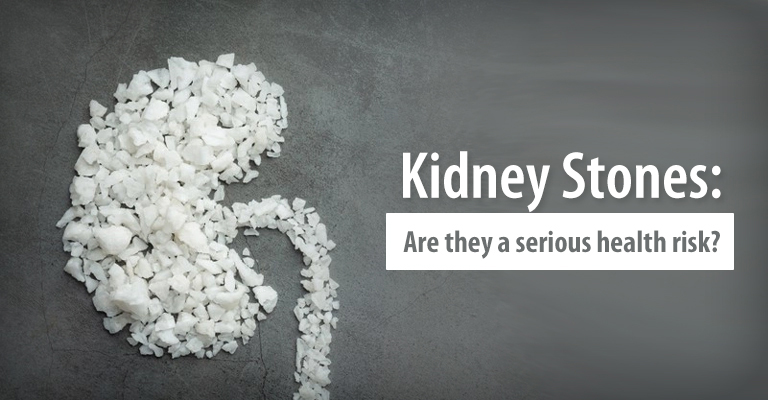
Minerals and salts sometimes collect at hard deposits inside kidneys to form stones. These deposits are also known as renal calculi, nephrolithiasis or urolithiasis. The causes could range from diet, obesity, certain ailments or medical conditions or some medicines and supplements.
The substances that combine to form stones, can usually pass through the urinary system. But sometimes, they can’t, since there isn’t enough urine volume, and these become highly concentrated and crystalize. This can be largely attributed to not drinking enough water.
It’s possible that you have had kidney stones for years without even knowing it. You will typically experience pain when the stone moves out of the kidney. Kidney stones become a nuisance and can lead to damage if they are the trigger for serial infections or are causing kidney blockage for a long time. Some types of stones can impair kidney function if not treated.
Adults are more at risk
Research shows that approximately 1 in 10 people will get a stone in the kidneys during their lifetime. However, once it reaches the bladder, it usually passes within a few days. It may take longer though, especially for someone older and with a large prostate. While kidney stones in children are far less common than in adults, children with asthma are four times more likely to have kidney stones.
What are the symptoms to watch out for?
Normally, a kidney stone doesn’t cause symptoms if it isn’t moving around within the kidney or passing into the tubes (ureter) that connect the kidneys with the bladder. In the ureters, the stone is likely to block urine flow, leading to inflammation and spasm. You might then experience symptoms like:
- Sharp pain in the side, back and below the ribs that can be severe
- The pain can radiate to your lower abdomen and groin area
- It can come in waves and with varying intensity
- You may feel a burning sensation while passing urine
- The colour of urine can be an indicator – pink, red or brown, instead of the normal amber
- Foul smelling urine that is foggy
- You may feel a constant need to urinate, yet be unable to empty your bladder
- A feeling of nausea and tendency to vomit are common symptoms
- Fever would indicate the presence of an infection
The site and intensity of the pain would depend on where the stone is lodged in the urinary tract.
Red flags for a doctor visit
Seek prompt medical aid if you have:
- Severe pain that makes it difficult to even sit still
- Nausea and vomiting accompany the pain
- You have fevers with chills along with the pain
- You pass blood with your urine
- You find it difficult to pass urine
What are the known risk factors for developing kidney stones?
You are more at risk of developing kidney stones if:
- You have a family history: Someone in your close family suffered from the same malaise.
- You have a personal history: If you have suffered an earlier episode of stones in your kidneys, you are more susceptible.
- You are not drinking enough water: Dehydration is a common cause, particularly for people living in warmer climates who have to deal with profuse perspiration.
- You diet is high on protein, salt, sugar and sodium: Excess salt in the diet means your kidneys have to work overtime in removing the extra calcium. This increases the risk of stones.
- You are overweight: Your body mass index or BMI and the size of your waist matter when it comes to kidney stones. Obesity is a known risk factor.
- You have GI conditions: Like Inflammatory Bowel Disease (IBS) or chronic diarrhea and gastric bypass surgeries sometimes bring about changes in the digestive process which affects the body’s ability to absorb calcium and water, which in turn increase risk of stones.
- You have certain medical conditions: Like Renal Tubular Acidosis, Cystinuria, Hyperthyroidism, recurring UTIs
- You are on supplements and medications: Excessive use of laxatives, Vitamin C, food supplements, antacids, antidepressants and some medicines used to treat migraine increase risk.
How are kidney stones diagnosed and treated?
The doctor uses imaging tests like X-ray, CT scan and ultrasound to diagnose and locate kidney stones. Blood and urine tests also provide important clues.
Treatment options
Sometimes, no treatment is required and smaller kidney stones may pass through with your urine. If your doctor feels treatment is necessary, you might be prescribed medications or advised surgery.
Medications: Medicines are used to relieve pain, manage nausea/vomiting and relaxing the ureter to allow the stones to pass.
Surgery: There are four surgical options to treat kidney stones. The first three of these are minimally invasive procedures.
- Ureteroscopy: A small instrument, an ureteroscope is inserted into the urethra, through the bladder and into a ureter to retrieve the kidney stones or breaking them apart using a laser.
- Shockwave lithotripsy: In this procedure, high-energy shockwaves are sent through water to break apart the stones, making it easier for them to exit your body.
- Percutaneous nephrolithotomy: In this procedure, a tube is inserted directly into your kidney through a small incision in the back. Stones are then disintegrated by an ultrasound probe and suctioned out.
- Open stone surgery:For this surgery, a bigger cut is used, compared to minimally invasive procedures, and is very rarely performed (only in 0.3% to 0.7% of cases).
At Medica, our specialists offer surgical treatment of kidney stones using minimally invasive procedures which ensure less trauma, shorter hospital stay and faster recovery.


